Media | Articles
Auto Anthro: Why luxury trucks don’t have luxury badges
Jack Swansey holds a degree in anthropology with a focus on car culture, and he is the world’s leading ethnographic authority (by default, if you must know) on NASCAR fandom. His love of the automobile fuels him to discover what cars mean to the people who own, drive, and love them. —EW
According to Kelley Blue Book figures as of October 2022, the average sale price of a new full-size pickup truck is $63,231, up 9.4 percent over last year, and nearly $9500 more than the average price of an entry-level luxury car.
Over sixty-three thousand dollars. That sum could cover a generously optioned BMW M340i or Porsche Macan—and that’s the average sale price. Ford’s top-of-the-line F-150 Limited costs just north of $85,000 before options, and certain trim lines on heavy-duty trucks crack six figures. Stuffed with leather, premium sound systems, and advanced tech features, these luxury pickups are about as far from the ordinary white work truck as a pigeon is from a peacock.

Why are Americans so willing to spend luxury-car prices on pickups from mainstream brands while the same product from a premium nameplate flops? Lincoln’s Blackwood and Mark LT couldn’t make it more than four collective model years while every Ford King Ranch that rolls off the line has a willing buyer.
There might be an anthropological explanation for this phenomenon. Hear me out: We Americans like trucks—and luxury trucks, in the proper context—in concert with our country’s deep-rooted Protestant work ethic.
Marketplace
Buy and sell classics with confidence
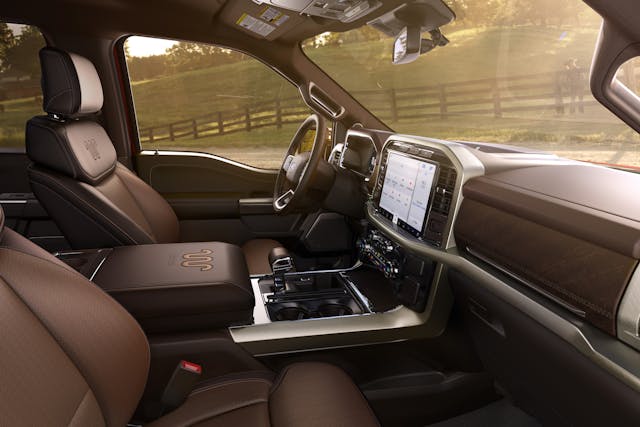
The phrase “Protestant ethic” was first used by the early 20th-century German sociologist Max Weber, but he was not the first to recognize the American society’s emphasis on the moral character of hard work. Alexis de Tocqueville marveled at the same phenomenon a century earlier. The Puritans considered economic success reflective of God’s favor. Even colonial Jamestown settler John Smith commanded: “He who will not work shall not eat.” From the very beginning, a pseudo- or openly religious glorification of labor has informed the way Americans interact with the world and each other.
The Protestant ethic is reinforced by the structure of our economy, the policy of our government, and yes, heroic national myths like the winning of the frontier. What started as Puritan religious dogma morphed into Gilded Age “bootstrap” fables, and eventually into the idealized blue-collar workers of Chevy’s “Like a Rock” ads. The ethic survives, changing with the times.

If there is one vehicle reflective of American values, it’s the trusty pickup truck. This is a machine that offers immense versatility and inherent practical value to the worker, but in the United States it has also come to represent significant value in the social hierarchy. Anyone who has felt the warm embrace of a GMC Denali interior knows that these are proper luxury vehicles—save for the badge.

Modern American culture in 2022 is much more diverse and multifaceted than it was in the 17th century, or even the early 20th, but the Puritan legacy is still evident. In many traditional circles, hard work is regarded as a fundamental moral good, while displays of wealth are considered vulgar. No matter how much money someone makes, carrying a camping pack through the woods, setting up a tent, cooking beans on a campfire, and sleeping under the stars makes people feel satisfied. Connected to nature. Blue jeans, although they were originally marketed as a uniform for miners in the California Gold Rush, have thoroughly permeated American fashion from the most basic threads to $300 raw denim.
Let’s go a step further. We’ve established that Weber’s Protestant work ethic considers labor to be a moral obligation, a commandment even. To watch the Super Bowl is to be inundated with marketing that idolizes hard work, the pickup truck its towering, mulch-hauling, stump-pulling symbol. Hard-hat-wearing miners, construction workers, and farmers treat trucks with generational reverence. Physical labor is often dirty and physically demanding, of course, though not always cinematically so. It’s a cliché, but only because it’s rooted in something real. Advertisers didn’t make it up to sell Trail Boss–emblazoned floor mats. Like independence and self-reliance, hard work—physical or otherwise—is an American value already underlying the stories many of us tell ourselves about ourselves and our country.

Consider that from our nation’s beginnings as a British colony well into the 20th century, most Americans still lived and worked in rural communities. The American economy transitioned rapidly to modern capitalism while our society was still mostly agricultural; our mainstream national values remain laced with the rugged individualism that characterized Thomas Jefferson’s ideal yeoman farmer. Today, the proportion of Americans who make their living via agriculture has never been slimmer. Truck manufacturers nevertheless still trade on the cultural pull of that figure. You may remember Ram’s “God made a farmer” commercial from back in 2013. One could argue we are now more a nation of contractors than growers, but the fact remains that tons of people still do serious physical labor, and they rely on their pickups—even the luxury models—to make their living.
https://www.youtube.com/watch?v=AMpZ0TGjbWE&ab_channel=RamTrucks
***
“Wait a minute,” you’re probably asking, “I get why people want trucks, but not why they’re willing to pay Mercedes-Benz prices for them.” Ah, but Weber has more to add on that subject:
“[The Puritans] did not wish to impose mortification on the man of wealth, but the use of his means for necessary and practical things.”
This is the crux of it. A truck is an infinitely practical device for work, and therefore, the ethic tells us, worth paying for. Even if a four-door pickup truck is primarily used for passengers, groceries, and sports equipment, it can do something a Lexus RX can’t: haul a sheet of plywood or tow a 25-foot cabin cruiser on a moment’s notice.
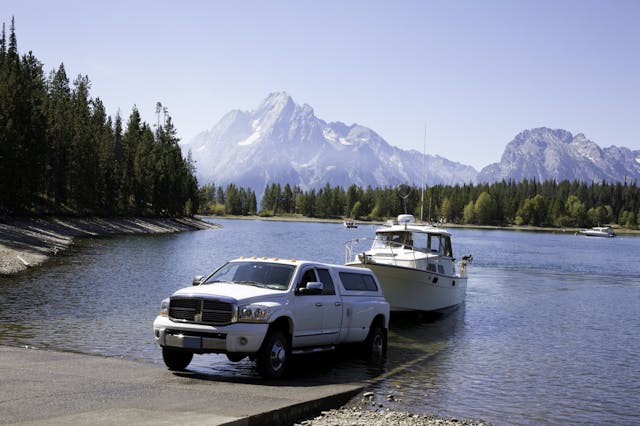
Conversely, high-trim American trucks are some of the most luxurious and stately vehicles on the road. (Not to mention how well they’re engineered.) Comfort features are often generous, and GM’s CornerStep bumpers, Ram and GMC’s multifunction tailgates, and Ford’s Pro Power Onboard electrical system combine technology and convenience in an everyday-usable package. Saving the day in a power outage, pulling a car out of a ditch, or hauling a new refrigerator from Lowe’s might not happen every single day, but the Protestant ethic puts a lot of value in even the potential for practicality. When the need arises, renting a truck from a company or calling up a friend … just hits different.
Finally, we return to the text on the tailgate. Think back again to Lincoln’s Blackwood (2002) and Mark LT (2006–2008). Ford Motor Company moved just 36,187 Lincoln Mark LTs between 2005 and 2009, against 796,039 F-Series trucks in 2006 alone. One can easily imagine that of nearly 800,000 Ford trucks sold, more than 36,000 were optioned highly enough to at least match the price of the Mark LT.
The reason people won’t accept a Lincoln truck is the same reason VW knows it will never figure out how to sell the Amarok in America, and why Mercedes never even tried with the short-lived X-Class.
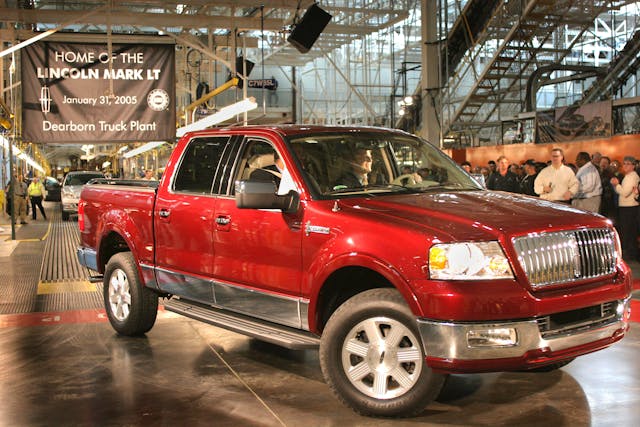
Weber again:
“[To the Puritans], irrational use [of wealth] was exemplified in the outward forms of luxury which their code condemned … this worldly Protestant asceticism … acted powerfully against the spontaneous enjoyment of possessions.”
Dominant historical American values disapprove of outward forms of luxury. Outward luxuries, that is. But when it comes to inward luxuries, like the “Heated and Ventilated Leather Front Bucket Seats with Active Motion” available on the 2022 F-150 Platinum, that’s another story. As long it has a bed, wears a Ford badge on the hood, and looks enough like the base model, it might as well be the Waldorf Astoria inside. A luxury truck is a rational purchase so long as it stays a Ford, Ram, Chevy, or even a GMC. An Escalade EXT pickup? Well, that’s just showing off.
As a non-truck-owning amateur anthropologist, it is my duty to point out that every single vehicle purchase is influenced by cultural and social forces—conscious or otherwise. This isn’t inherently good or bad, it’s just reality. Our culture in America today is diverse, nuanced, and at times contradictory. Certain aspects of it are inescapable.

The Ford Maverick, a four-cylinder unibody minitruck sales phenom, suggests that the social forces driving Americans towards trucks aren’t limited to full-sizers. And despite the hate they sometimes get from truck purists, the Rivian R1T, Ford F-150 Lightning, and Chevrolet Silverado EV are being met with considerable demand. Which tells us that the values people associate with pickup trucks are not inextricably linked to internal combustion.
Detractors will contest that the current crop of full-size trucks isn’t great for pedestrian safety, the atmosphere, or urban street parking. Proponents will fire back that no vehicle meets their various needs so effectively and reliably, and people who don’t understand that probably never will. The debate is so interesting and persistent perhaps because it is a larger societal conversation in miniature—the long-dominant Protestant work ethic being poked at, examined, and weighed against other perspectives. Such scrutiny is a common enough social phenomenon, historically speaking.
For my part, I think there is nothing fundamentally wrong with desiring a high-end vehicle if you can afford it, or a vehicle with extraordinary utilitarian potential for those moments you need it, be that once a week or once a year. Dropping Macan money on a Silverado doesn’t make a whole lot of sense to me personally, but the market at large thinks otherwise. Regardless, it is fascinating the way we showcase (or don’t) our ideas about work and luxury in the vehicles we drive.
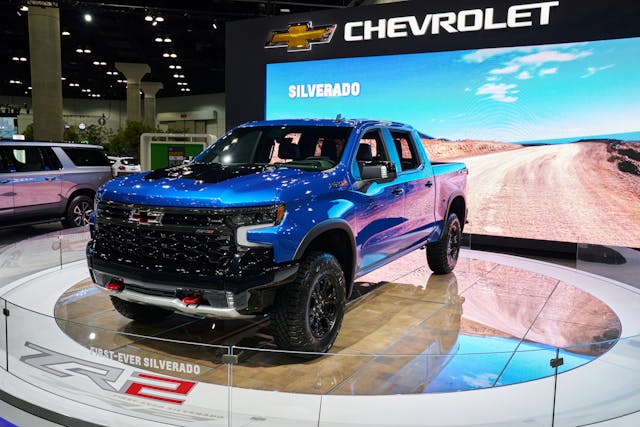
Check out the Hagerty Media homepage so you don’t miss a single story, or better yet, bookmark it.
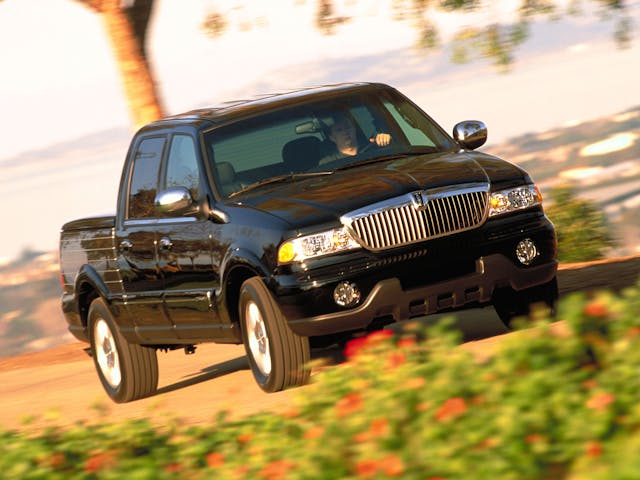














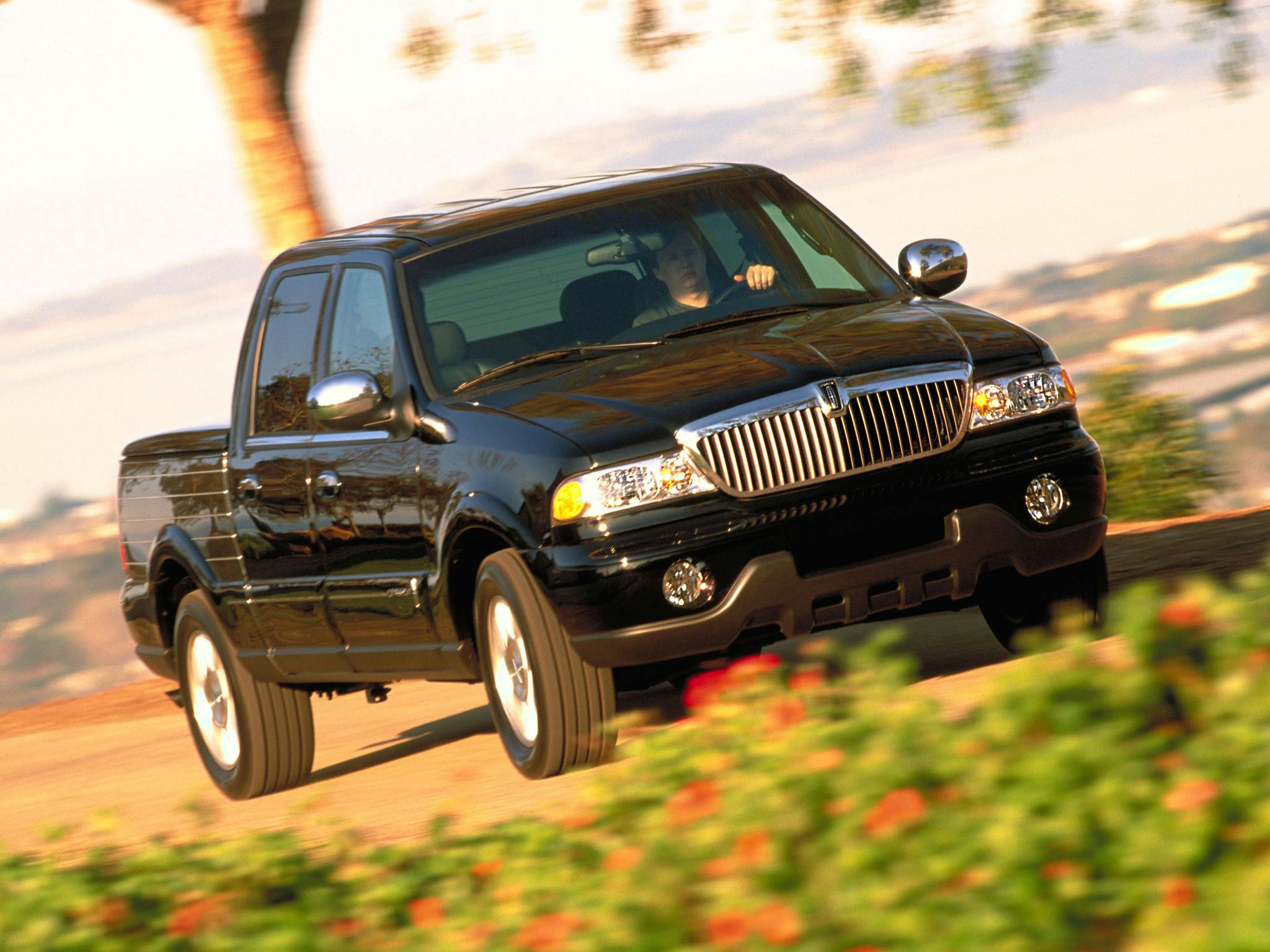
Lincoln has been in trouble as a brand for some time. And aspects of those trucks were (to my eyes) an inferior look (i.e., the extra reflector on the tailgate to make it look different than the F150 taillights).
Denali is practically a luxury sub-brand on its own. The case to spin it off or at least laterally into Cadillac makes some sense.
It will be interesting if Toyota ever tries to Lexus truck us.
The crew cab truck is the 1960s Impala of today in the way the masses use them.
I LOVE my King Ranch F350 and the author has nailed the reason why. Luxury vehicle that can do anything. What’s not to like? Also took on a Toyota minivan sliding into the running boards with no damage during an ice storm last Monday. The minivan did not fare so well. The lady driver will be telling her husband a ‘story’ lol…
Agreed crew cab is the Impala of today. I liked the Impala…
The problem with pick up trucks is that I always need it one day each year and have no use for it on the other 364. I haven’t been able to justify buying one. For my light duty tasks, I find my minivan much more practical. My wife demands that any vehicle we own have all the bells and whistles, so if I had to buy one, it would be one of these luxury cruisers.
I used a mini-van for hauling 4X8 sheets of plywood and drywall. 80% of the pickups running around have only 5 1/2 to 6 foot beds. Maybe they can haul some mulch for the spring gardens. Must pickup beds a virtually useless. The pickup, for some reason, is thought to be the sign of male virility. I see quite a few little guys with large raised truck.
Ah yes, the ‘little man syndrome’..
Women can spot them instantly.
Your last sentence nailed it.
Then why has Ford axed the Transit Connect Titanium? With added greedy dealer markups it was $42,300 ,with taxes and fees. Yet for our Dog show needs it’s a PERFECT vehicle and about every show we go to, more show up. Must be a poor marketing department that sits back instead of doing research.
Russ, I’m still using my Honda Odyssey as a dog show vehicle. It’s old, high mileage, and a bit rough around the edges…..but it’s a perfect platform for my needs. Just returned from our Nationals, and the Honda performed flawlessly.
I have no issues with the overpriced luxury trucks on the market today. Just shows the exponential increase in the Napoleon complex in the American society. But for those of us who REALLY work, not just some pencil pushing yuck yuck pretending to be one of us with his clean Stetson straw and unscuffed boots and tiny appendage, it’s nearly impossible to find a REAL truck: regular cab, 8 ft. bed, 4×4, v8, rollem down yourself windows and locks, for ACTUAL work. When we do find them, they’re only a few grand less than your wannabe trucks. Hard to get the real work done with the posers running a work truck up in price. Won’t be long before the posers will have to become real workers, because we can’t afford a work truck to get to those jobs and get em done so that you don’t have to ruin your sissy manicure.
Trucks are popular because face it, they are comfortable. Nothing wrong with an economy car, but the end of the day, would you rather take a 500 mile trip in a Fiat 500 or a pickup truck. If the cost of gas is not an issue, the pickup truck, or full size SUV is just a better traveling vehicle. Seats are larger, you can see over other vehicles while looking at traffic trouble. The end of the day the only reason to not get a full size truck is 1) Price, 2) Cost of fuel 3) person has trouble parking.
Love the article. Love my trucks. Want a new one. Time isn’t right. I have an Anthropology major. Don’t remember studying trucks in relation to anthropology!
Love my GMC Sierra. Don’t know why I went so many years without a full size pickup !
I don’t disagree with anything the author has written… In fact I think it’s a very good take. But I do think he’s missed a key point. A combination of regulation and cultural changes have reduced the full-size sedan to a shadow of their former self. When the Chrysler L-cars cease production, they will be literal ghosts.
Any of the 50s-70s full sizers could pull trailers with ease (being most familar with vintage Mopars, I know they could do up to 7,000 lbs. properly equipped). A landlord could drop a snowblower/lawnmower in the trunk of a 70s New Yorker and shuttle across town to beat the code inspector if necessary. I know this because I’ve done it. With a modern 300? Good luck getting a weed whip in there, after folding the armrest. Last summer I dropped a Velux Solar Tube, a 50′ aluminum coil and a bunch of other construction junk in the trunk of my 2003 Town Car (which I keep lined with old blankets) with zero fuss.
I do own a couple trucks that would easily do this, but I’d RATHER drive the Lincoln and it CAN do those lighter jobs when necessary. I begrudgingly own the trucks. I enjoy the Lincoln and the New Yorker. I’d happily plop down the required cash if I could buy a modern version of either. Modern sedans are nuetered and useless to me.
The Denali is for the Escalade buyer who doesn’t want the Cadillac badge and related image. No way they should spin it off.
This all makes so much sense. We WANT to experience luxurious excesses, but we NEED to obscure and to justify them. We COULD be driving a BMW or a Lexus, but then the turds are in the passenger compartment. Everyone knows that in a truck, the manure goes in the box.
You said it, Bud!
Luxury pick-ups like the Blackwood were not popular with ‘real men’ for the same reason men didn’t want a VW with an interior flower vase.
My 2003 Silverado took on a KIA whatever at an intersection where it couldn’t stop in the rain and it barely bent the bumper where the KIA lost all it’s sheet metal to the windshield.
I really can’t afford to spend 60K on a new pickup but I’m going to need one in the near future. I hope that the big 3 will keep making rubber floors and roll up windows for those of us who actually beat on a truck.
I recently ordered a f150 XL. Ford does a great of offering as a friend put it, everything you need and nothing you don’t. The vinyl buckets are comfortable and the rubber mats are perfect. Good sound system, alloys, 5.0 v8, 36 gallon fuel tank, 4×4 with tow package for way less than 50k. Pulls my 26’ Airstream like a dream. I’ll take that extra $ and take a few more trips every year.
I appreciate that you tried to pull the Protestant work ethic and some other anthro thoughts into this piece, but you tried way too hard and completely missed the REAL reasons the trucks cost what they do. To begin, the PRICE of pick up trucks went up a year after the Bush tax cuts in the early 2000s kicked in – remember, if your vehicle weighed a certain amount you could write the whole damn thing off. Second – financing rates have been super cheap for almost 20 years (in general) – until now, so financing more and more expensive trucks didn’t really cost the consumer that much more – $55k at 3% or $65k at 2% is negligible. Third – the majority of folks are financing these rigs out to 72 months, and again, 72 months at cheap money, it is not a bad deal. The impending recession will make a big difference on pricing, and I have already seen the big guys advertising rates at 2.7% on their own paper – it will be interesting to see how long that lasts.
Like everything else in America it about profit. The profit margin on trucks is significantly greater then cars. Advertisement works and to be a “real man” you got to drive a truck. The bigger the truck the more “rugged individualist” you are, the more “American Macho” you are. There’s a reason corporations pay billions in advertisement to lead “consumer” by the nose.